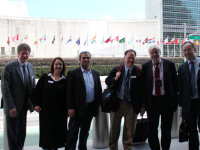Building Momentum for Peace

- UN office of the Special Advisor on the Prevention of Genocide and R2P.
- UN Interagency Framework Team for Preventive Action.
- UNICEF.
- US Institute for Peace.
- US State Department
- US House of Representatives.
- Friends Committee on National Legislation.
The practice of unarmed civilian peacekeeping is maturing as NP and a handful of other organizations gain and learn from our field experience. In his presentation at the Interagency Framework Team, Tim Wallis, NP’s executive director, explained how UCP is now in its 3rd generation with each successive stage building on lessons learned from the previous stages. Our work is much more interactive and dynamic engaging all of the stakeholders in a radical nonpartisanship. A major focus is on training and supporting local civil society to protect their own communities. As this work progresses we are transforming the world’s response to conflict.
Peace Brigades International (PBI) joined us for our presentations to USIP and the US House providing a concrete example of how all of the practitioners need to work together to advance the field. Jit Man Basnet was one of the presenters. He is a human rights lawyer, journalist, and writer from Nepal, who was held and tortured by the Nepalese military. After publishing a book about the ordeal, he came under direct threat again. Jit Man told how he went to the UN in Katmandu and asked for protection. They told him they could not help him but directed him to PBI who has been providing him with protective accompaniment for several years. To hear the entire USIP Briefing go to www.usip.org/newsroom/multimedia/audio/briefing-unarmed-civilian-peacekeeping
In hosting the Congressional Briefing, Representative Keith Ellison noted how easy it is for Congress to come up with resources to wage wars but they seem to be unaware of nonviolent peacekeeping. He pledged to bring Congressional leaders together to discuss how the US can join other national governments in supporting unarmed civilian peacekeeping.
The Highlight of the tour was the High Level Briefing at the UN on “Broadening the Concept of Peacekeeping: The Contribution of Civil Society to the Unarmed Protection of Civilians.” Hosted by the UN missions from the Philippines, Belgium, Benin and Costa Rica, this event marked the first time UCP has received this level of attention.
A standing room only crowd representing 58 missions to the UN as well as UN entities and NGOs heard Rafael Seguis, the Undersecretary of the Philippine Department of Foreign Affairs affirmed the strong contribution well-organized civil society can play in protecting civilians amid violent conflict. Citing the choice by both the government of the Philippines and the Moro Islamic Liberation Front of NP as the only international nongovernmental organization to be part of the official agreement on Civilian Protection, Undersecretary Seguis stated, “Both parties were already aware of Nonviolent Peaceforce’s presence in the very ‘hotspot’ areas of Mindanao…it’s track record on the ground with respect to conflict prevention activities and the good relations it continues to maintain with local stakeholders.”
He pointed out that it was "a unique model of unarmed civilian protection that directly engages civil society groups doing peacekeeping work, and taps into their knowledge, experience and manpower," and that this arrangement has contributed to the peace process.
Tiffany Easthom, Country Director of the Nonviolent Peaceforce´s peacekeeping project in South Sudan described how unarmed civilian peacekeepers are protecting civilians and supporting local civil society in preventing violence in some of the most violent places in the world. These peacekeepers engage in a variety of strategies and must remain “nimble and adaptable.” She recommended that these, “newly proven practices need to be supported and scaled up…Unarmed civilian peacekeeping is an entirely appropriate response to violent conflicts in many more countries in many more situations and needs to be scaled up,"
Chris Coleman, Director of the Civilian Capacity Project at the United Nations, noted that UCP does not fit every situation, “Unarmed civilian protection is not a perfect instrument… It is not always the right tool… It is, however, a tool that in some circumstances is the right one, the appropriate one, the most effective one. It is a tool that can sometimes be productively deployed on its own, sometimes alongside other instruments, for example within the context of a more conventional peacekeeping operation. Let’s make sure we have the systems in place to use it when we need it.”
After a question and answer session, the Permanent Representative from Belgium, Ambassador Jan Grauls observed that there had been a lot of convergence at the briefing and that UCP linked to a number of other debates at the UN including Protection of Civilians, Responsibility to Protect especially following Libya, civilian capacities and women as actors. “The interest, energy and motivation are high to pursue this discussion.”
This high level briefing was a breakthrough event for Nonviolent Peaceforce. After the briefing, Cora Weiss, President of the Hague Appeal for Peace, commented, “In over 40 years of working around the UN I have never seen an NGO pull off what you did, getting four member states to present your issue."
We are now vigorously pursuing the next steps of building a strong base at the UN for UCP. Watch this space for progress. Someday soon, unarmed civilian peacekeeping will be a readily available and oft used resource to protect civilians and support them in preventing further violence. The momentum builds.
By Mel Duncan
